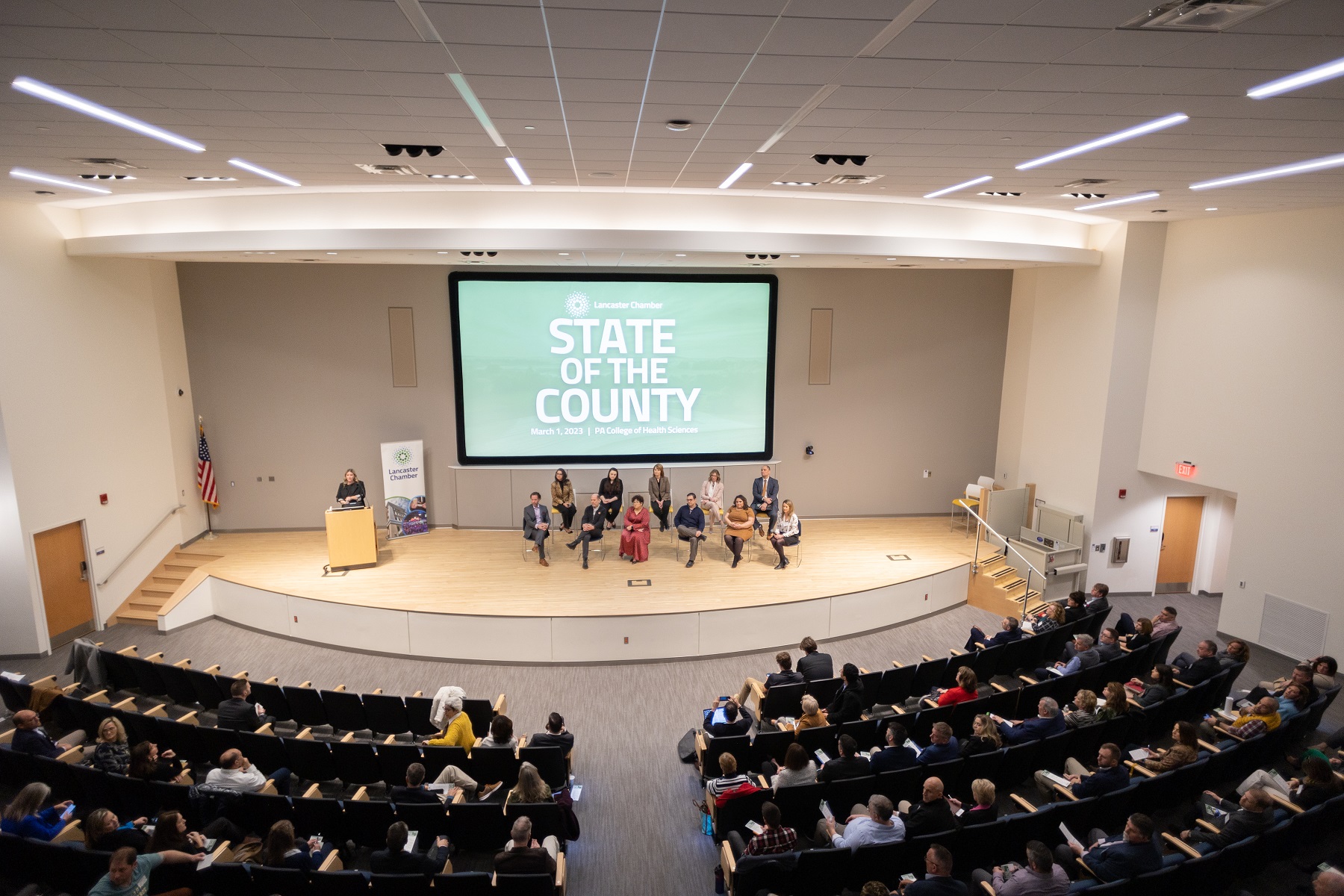
Business leaders have an essential role to play in helping Lancaster County tackle emerging economic and social challenges, Lancaster Chamber President and CEO Heather Valudes told her audience at the chamber’s annual “State of the County” presentation Tuesday morning.
Entrepreneurs and CEOs retain a large measure of public confidence, she said. She cited the 2023 Edelman Trust Barometer, which shows trust in business exceeding that afforded government, nonprofits or the media.
Moreover, she said, they have a “stakeholder mindset” and can work across institutional boundaries to create innovative solutions.

Lancaster County generates the 7th largest GDP among Pennsylvania counties and has record low unemployment and record high labor force participation.
At the same time, Valudes said, it faces the task of balancing development and preservation, creating opportunity and adjusting to demographic and economic trends.
So, in what areas can business lend a hand? Speakers at the event, held at the Pennsylvania College of Health Sciences, covered four, in each case presenting both the issue itself and current initiatives around it:


CEO, Tenfold

(All photos courtesy of The Lancaster Chamber | © PhotOle Photography)
Affordable & Fair Housing

Lancaster County’s housing vacancy rate of 4.6% is in the lowest 5% among 365 U.S. metropolitan areas, said Rae Ann Miller, data analysis for the Economic Development Co. of Lancaster County’s Center for Regional Analysis.
Further complicating its tight housing market is a misalignment of supply and demand: Household size is getting smaller, and more and more people are living alone, yet nearly 6 out of 10 housing units built over the past decade were single family homes.
That’s pushing up housing costs for working class families, who are competing with each other for the limited number of available units, said Shelby Nauman, CEO of the housing nonprofit Tenfold, citing the United Way’s “ALICE” data for Lancaster County and the National Low Income Housing Coalition’s “Out of Reach” report.
Fortunately, a number of apartment buildings are in the pipeline that advocates hope will ease the pressure, Nauman said.
Peter Barber, President & CEO of Two Dudes Painting Co., which is a certified B Corporation, described his company’s homebuyer assistance program, developed in partnership with Tenfold. Down payments are the No. 1 challenge for would-be homeowners, he said, adding that helping employees achieve that dream inspires “hope, motivation and opportunity.”

CEO, YWCA Lancaster

Lifting Up Diversity
Released in January, the Lancaster County Racial Equity Profile is the first analysis of its kind in Pennsylvania. It was developed to create a shared baseline for productive discussion, said Stacie Blake, CEO of YWCA Lancaster.

She and Vanessa Philbert, CEO of Community Action Partnership of Lancaster County, encouraged business and community leaders to engage with the profile and its findings.
It’s a work in progress, Blake said, one that hopefully can help Lancaster County live up to its reputation as a great place to live “for everybody who’s here.”
Philbert said CAP is taking a look at its staffing practices for its child care centers, where many of the teaching assistants are Black or Latino but the majority of lead teachers are White.
In a pre-recorded video, Felicia Bechtel of engineering firm Rettew outlined the company’s diversity, equity & inclusion initiative, which earned it a Diamond Award from the American Council of Engineering Companies.



Director of Fun,
Kitchen Kettle Village
Workforce Solutions
With Baby Boomers aging out of the workforce and immigration driving a majority of population growth, investing in the skills of early and mid-career employees is essential to job growth and retention, said Anna Ramos, executive director of the Lancaster County Workforce Development Board.
Jared Erb, “First Choice” career coordinator at Pequea Valley School District, and Lisa Horn, director of fun at Kitchen Kettle Village, provided examples. Pequea Valley’s “First Choice” initiative is a comprehensive career development program, incorporating guidance, job shadowing, internships, apprenticeships and a mentoring program that matches every single 10th grader with a community mentor.
Kitchen Kettle provides numerous internships and job opportunities and runs a shuttle to and from Pequea Valley High School for students with after-school jobs.


Fostering Safe Community
No community can arrest its way out of its crime problem, Lancaster County District Attorney Heather Adams and Lancaster Police Chief Richard Mendez agreed. That’s why her office supports diversion programs, Adams said — an individual successfully treated for an addiction or a mental health problem is much less likely to reoffend.
Adams also highlighted the county’s Human Trafficking Task Force, which recently completed its first year in operation.
The Lancaster Bureau of Police is ramping up community engagement and providing trauma-informed training to its officers, Mendez said. Community cooperation is essential, he and Adams emphasized: “We can’t do it alone,” Mendez said.

The bottom line
In a Q&A following the presentations, the speakers encouraged partnerships among community stakeholders, saying they are most fruitful when they have clear goals, their members have clearly defined roles and everyone stands to benefit.
Housing offers the prospect of such a win-win, Nauman said: Increasing the supply of affordable housing would serve employers’ recruitment needs, allowing them to grow.
“Advocating for projects in your municipalities would be hugely helpful,” she said.
Conversations about diversity, equity and inclusion can be uncomfortable, they help build stronger organizations and communities, said Clayton Bubeck, President & CEO of Rettew. Barber said it’s important to overcome the barriers to your workers speaking up — that’s how you find your way to genuine solutions.
Philbert said the issues she and her fellow panelists covered can’t be looked at in isolation, or as mere data points. Real people and their lives are involved.
“Our responsibility is to look collectively at the human experience,” she said.






